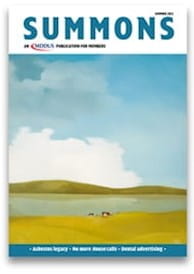IT IS ONLY a few weeks now until our television screens will be ablaze with one of the biggest events of the sporting calendar – the Olympic and Paralympic Games. With all the excitement looming, there will be staff issues to consider for practices whose employees are looking for time off during the event.
Employees may request time off to attend events or to work as a volunteer, but there is no legal obligation to grant these requests.
Volunteers will have been notified by now and it would be advisable to check with employees if any of them have been accepted so you can start planning for their absence. Each volunteer will spend a minimum of 10 days working at the events and will have to attend three training sessions prior to this.
Some options to consider for employees who plan to attend/volunteer at the Games include:
• taking annual leave
• making up time at later date
• allowing flexible working during the Games
• granting special leave – paid or unpaid
• a combination of the above.
Under employment law terms, there is no obligation to give paid time off unless there is something in the contract that states this will be granted, which is unlikely.
With annual leave, it would be advisable to discuss the matter now to establish how many employees plan to take time off during the Games.
If an employee is requesting annual leave, the practice must comply with its obligations under working time regulations. For every day of holiday required, employees should give employers at least twice as much notice, so to request two days’ leave they need to give four days’ notice. There may be different provisions set out in your contract or holiday policy and these should be adhered to.
If the practice cannot accommodate the request, the employee should receive counter notice of the refusal as soon as possible to avoid disappointment. In the absence of any practice policy on the matter, the counter notice must be given at least one day in advance for every day of leave requested, i.e. two days’ counter notice if refusing a request for two days’ annual leave.
If you have a number of employees competing for time off, this may already be covered in the practice’s holiday policy. If not, then you can deal with the requests on a ‘lottery’ basis and pick names out of a hat to ensure fairness or deal with the matter on a first come, first served basis.
It is important to avoid any allegations of unfair or discriminatory action by being consistent, transparent and thinking about how you will manage annual leave requests.
Another important issue for practices to consider is unauthorised absences which may be higher than normal during the Olympics. Any cases of suspected unauthorised absence should be handled as a misconduct issue and dealt with in accordance with the practice's disciplinary procedure. For clarity, both disciplinary and absence procedures should state that unauthorised absence will constitute misconduct that is likely to lead to disciplinary proceedings.
Another consideration for managers during the Games is the possibility of poor performance amongst employees, perhaps due to overly enthusiastic post-event celebrations, and employees should be advised that this behaviour is not acceptable.
Practices should also be alert to the possibility of employees trying to watch lengthy coverage at work on TV or on their computers. It is worth advising staff that this is not acceptable and those who want to watch the Games may request to alter their hours on a temporary basis. Practices will need to consider what flexible working arrangements are in place and if this can be accommodated in the short term.
There will be employees who have no interest at all in the Olympics and it is essential for the practice to consider this so that managers are not left open to accusations of showing favouritism towards those who are interested in the Games.
Liz Symon is an employment law adviser at MDDUS
Note: this article first appeared in Practice Management magazine
This page was correct at the time of publication. Any guidance is intended as general guidance for members only. If you are a member and need specific advice relating to your own circumstances, please contact one of our advisers.
Read more from this issue of Insight

Save this article
Save this article to a list of favourite articles which members can access in their account.
Save to library